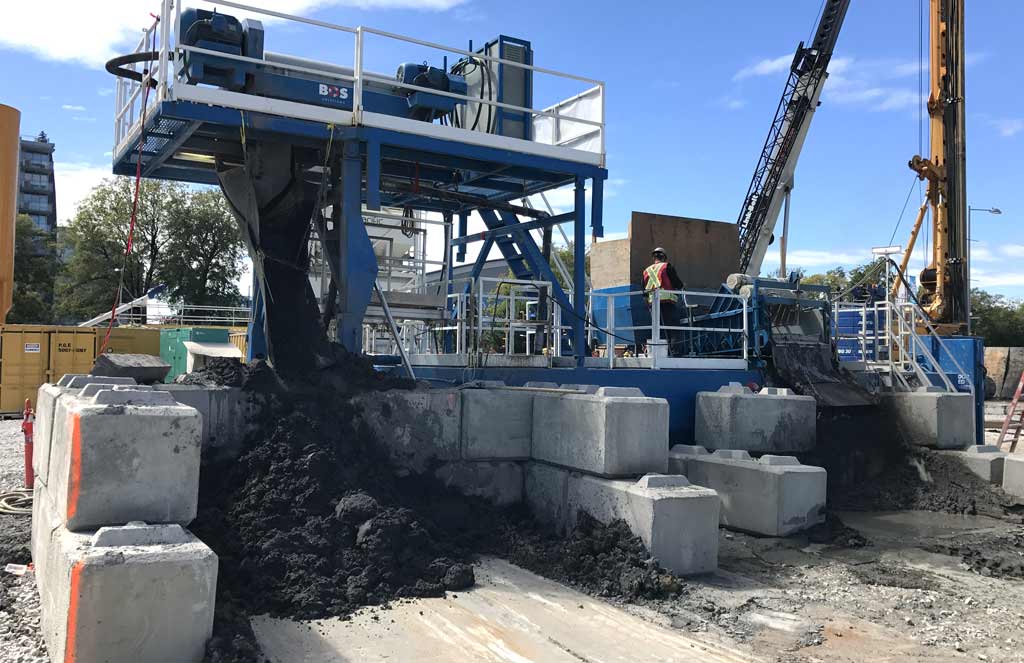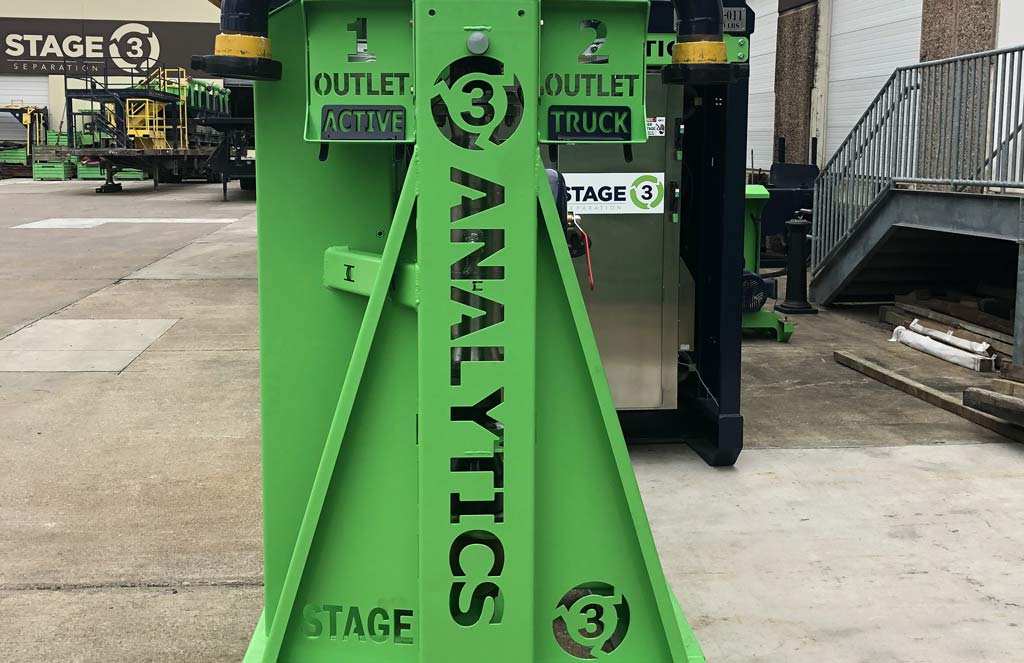Solids Control Platform
Custom, Data-Driven Solids Control
Maximize Efficiency, Minimize Waste with Advanced Drilling Fluid Management
Your bottom line is directly impacted by how efficiently you manage fluids and waste in your drilling operations. Stage 3 Separation’s performance-based solids control systems are designed to revolutionize your processes, combining cutting-edge data analytics with innovative equipment tailored to your specific needs.
Whether you need to remove all solids or target a precise level, our advanced approach delivers cleaner fluids that boost your pump rates and accelerate your drilling speeds. By optimizing your drilling fluid performance, you’ll not only reduce your environmental footprint but also significantly cut your operational costs across oil, gas, and geothermal projects.
With our real-time monitoring and adaptive technologies, you’re assured that your solids control process is always operating at peak efficiency. Experience the power of custom solids control that evolves with your drilling challenges.
Comprehensive Solids Control
Applications for All Fluid Types
Our closed loop mud systems, dewatering, and remediation services are optimized for:
Oil-based muds
Maximize oil recovery and reduce disposal costs
Maintain optimal rheological properties for challenging wells
Clear water systems
Ensure crystal-clear fluid returns for sensitive operations
Minimize environmental impact in freshwater drilling
Water-based muds
Efficiently remove drill cuttings while preserving mud properties
Reduce water consumption and waste volume
Brines
Maintain density and clarity in high-salinity environments
Extend the life of expensive brine fluids
Diesel emulsions
Effectively separate and recover valuable diesel
Comply with strict environmental regulations for diesel use
Synthetic emulsions
Preserve costly synthetic base fluids for reuse
Maintain optimal performance in high-temperature, high-pressure wells
Our tailored solutions ensure you get the most out of every fluid type, reducing waste and improving your drilling efficiency across all operations.

Whole Project Planning & Implementation
As part of our service, we work closely with your team to carefully customize and tailor a comprehensive solution for your entire project. From equipment selection to process optimization, we cover it all – including mud tanks, shakers, centrifuges, degassers, desanders, desilters, screens, mud cleaners, and conditioners.
Our expertise extends beyond solids removal, offering applications for water and soil sampling and testing, as well as analytical reporting and ongoing support services. By integrating our advanced solutions seamlessly with your operations, we ensure optimal performance and efficiency throughout your project lifecycle, adapting to your changing needs every step of the way.
Our Trusted Process
1. Pre-Project Planning
Collaborate with our experts to define your project scope, from KPIs to environmental concerns. We gather crucial job details, fluid specifications, and site information to determine the optimal equipment setup. Our engineering team then crafts a tailored action plan, leveraging historical data to maximize value for your specific needs.
2. Live Management
Experience real-time optimization with our highly skilled technical team. Using IoT devices and advanced sensors, we continuously monitor and adjust operations for peak performance. Our diverse group of experts, including PEs, mud engineers, and solids control analysts, conduct daily fine-tuning and weekly comprehensive reviews, ensuring constant improvement across all your job sites.
3. Post Project Analysis
Benefit from our thorough post-project evaluation. Our laboratory services team generates a customized, comprehensive report detailing how our solids control management has maximized your ROI. We compare historical performance data with your end-of-job results, providing actionable recommendations for future projects and ongoing operations.
Reporting Services
Harness the power of data-driven insights with our comprehensive reporting services. Our advanced data collection and analysis capabilities allow us to generate in-depth, actionable reports that drive operational excellence:

Let Stage 3 guide you to sustainable success.
Meet with the experts in fluids management and find out how our services can help you.
Introduction to Solids Control
Solids control is a critical process in drilling operations, particularly in the oilfield industry. It plays a pivotal role in maintaining the efficiency and cost-effectiveness of drilling projects, from Houston to Midland and beyond. At its core, solids control involves the removal of drill cuttings and other unwanted solids from drilling mud, ensuring optimal mud properties and system performance.
In the competitive landscape of Texas and other oil-rich regions, solids control equipment and services have become essential for drilling companies seeking to maximize their operational efficiency. A well-designed solids control system typically includes various components such as shale shakers, hydrocyclones, and centrifuges, all working in harmony to manage the complex mixture of fluids and solids encountered during drilling.
The importance of solids control extends beyond mere waste management. By effectively removing solids, these systems help maintain the proper mud weight and viscosity, crucial for controlling formation pressures and preventing wellbore instability. This, in turn, leads to improved drilling rates, reduced pump maintenance, and overall cost savings for the project.
Solids control technicians play a vital role in this process, operating and maintaining the equipment to ensure peak performance. Their expertise contributes significantly to the success of drilling operations, making them valuable assets in the industry.
As environmental regulations become stricter, especially for operations near sensitive areas, the role of solids control in minimizing waste and environmental impact has grown even more critical. Companies like Stage 3 Separation have risen to meet these challenges, offering innovative solutions that combine efficiency with environmental responsibility.
The Science Behind Solids Control
The science of solids control is a complex interplay of fluid dynamics, particle physics, and chemical interactions. At its core, it deals with the management of total suspended solids (TSS) in drilling fluids. A solids control technician must understand the behavior of various particle sizes and their impact on fluid properties.
Key to this process is the concept of particle size distribution. Larger cuttings are easier to remove, while finer particles pose a greater challenge. The quality of solids removal directly affects the drilling fluid’s viscosity, density, and overall performance. Precision in this removal process is crucial for maintaining optimal mud properties.
Advanced solids control systems employ a variety of techniques. Jet mixing, for instance, is used to maintain homogeneity in the drilling fluid. Specialty equipment like smart dryers further enhance the efficiency of solids removal, reducing liquid content in the separated solids.
The petroleum industry relies heavily on manufacturers who produce high-quality solids control equipment. These manufacturers continually innovate, developing technologies that improve the efficiency of solids removal and fluid recycling. Understanding the science behind solids control is essential for technicians and engineers alike.
Key Components of a Solids Control System
A comprehensive solids control system is composed of several critical components, each playing a vital role in the treatment of drilling fluids and wastewater. Companies like Stage 3 Separation offer a range of equipment designed to optimize this process.
Centrifuges are star performers in solids control, efficiently separating fine particles from the drilling fluid. These dynamic machines use centrifugal force to remove solids as small as 2-5 microns, significantly improving fluid quality. Many companies offer centrifuge sales and replacement parts to keep operations running smoothly.
Dryers, another crucial component, further reduce the liquid content in separated solids. This not only minimizes waste volume but also allows for potential reuse or safer disposal of dried cuttings. Manufacturers continually innovate dryer technology to enhance efficiency and reduce energy consumption.
Shale shakers, often considered the first line of defense, use vibrating screens to remove larger cuttings. The selection of proper screen mesh is critical for optimal performance and requires regular degradation tests to ensure efficiency.
Mud cleaners and desanders complete the solids control lineup, working in tandem to remove progressively finer particles. These components often incorporate hydrocyclone technology for enhanced separation.
For a truly comprehensive approach, some companies offer integrated systems like the Direct Cuttings Discharge Conveyor (DCDC), which combines multiple treatment steps for efficient solids management.
Consulting services play a crucial role in designing and optimizing these systems. Experts can conduct tests, recommend equipment configurations, and provide training to ensure peak performance. Many manufacturers also offer specialized schools or training programs for technicians and engineers to stay updated on the latest technologies and best practices in solids control.
Advanced Technologies in Solids Control
The solids control market has seen significant advancements in recent years. These developments have revolutionized both onshore and offshore drilling operations, offering more efficient and environmentally friendly solutions.
One notable innovation is the introduction of semi-automated systems that reduce the need for constant operator intervention. These smart systems can adjust parameters in real-time based on fluid properties and drilling conditions, optimizing performance and reducing human error.
Pump technology has also evolved, offering progressive cavity pumps that can handle high-solids content fluids with minimal degradation. These pumps are essential for maintaining the integrity of the drilling fluid throughout the solids control process.
The rental market for solids control equipment has expanded, allowing companies to access cutting-edge technology without significant capital investment. This has opened up opportunities for smaller operators to compete effectively in the market.
Consultants play a crucial role in helping companies navigate these technological advancements. Their expertise is invaluable in selecting the right equipment, optimizing processes, and training operators. Many consultants offer basic to advanced training programs, helping to build a skilled workforce in the industry.
As the industry continues to evolve, companies like Separation 3 are focusing on developing free resources and educational materials to help operators stay informed about the latest trends and best practices in solids control.
Solids Control for Different Drilling Fluids
Different drilling fluids require specialized solids control approaches. Water-based, oil-based, and synthetic-based muds each present unique challenges. Vertical and horizontal rigs often require different setups, with suppliers providing customized equipment to meet specific needs.
Environmental Considerations in Solids Control
Environmental concerns are paramount in modern drilling operations. Odor control and the management of dissolved solids are critical aspects. Companies are investing in tech-driven solutions to minimize waste and improve recycling processes. Stage 3’s advanced systems help reduce the environmental footprint of drilling operations, aligning with stringent regulatory requirements.
Economic Impact of Effective Solids Control
Effective solids control significantly impacts the bottom line. By maintaining optimal fluid properties, companies can reduce drilling time and costs. The sale and rental of high-quality solids control equipment represent a growing market. Suppliers offer competitive factory prices, allowing even smaller operations to access top-tier technology. The long-term savings often outweigh the initial investment in advanced systems.
Solids Control in Challenging Environments
Challenging environments, such as deepwater offshore rigs or mining operations, require specialized solids control solutions. In the mining industry, solids control plays a crucial role in mineral processing and water management. Adapting drilling techniques and equipment for these unique settings is essential for operational success.
Best Practices for Solids Control Management
Implementing best practices is crucial for optimal solids control. This includes regular maintenance, proper equipment sizing, and continuous monitoring. Many companies offer specialized training schools to ensure operators are well-versed in the latest techniques. Proper management can significantly reduce wear and tear on equipment, extending the life of critical components like shaker screens and centrifuge parts.
Future Trends in Solids Control
The future of solids control lies in automation and data-driven decision-making. AI and machine learning are being integrated into control systems, allowing for real-time adjustments and predictive maintenance. Companies are also focusing on developing more compact and efficient equipment, particularly beneficial for offshore operations where space is at a premium.
The Critical Role of Solids Control in Modern Drilling Operations
Solids control remains a critical aspect of modern drilling operations, impacting efficiency, cost, and environmental compliance. As technology continues to evolve, companies that invest in advanced solids control systems and proper training will be better positioned to meet the challenges of tomorrow’s drilling landscape. The ongoing innovation in this field promises to drive further improvements in drilling performance and environmental stewardship.

